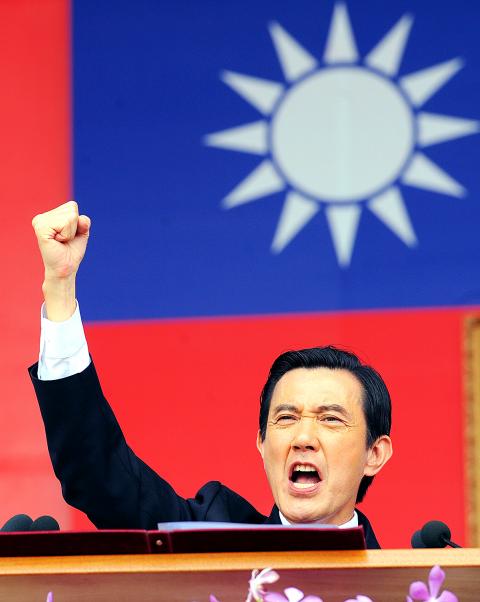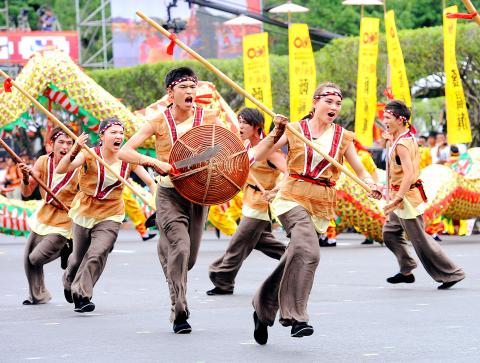President Ma Ying-jeou (馬英九) yesterday called on the People’s Republic of China (PRC) to model itself on the Republic of China (ROC), which he said “remade itself in Taiwan” during the past six decades.
Yesterday marked the centennial of the beginning of the Xinhai Revolution, which ended imperial rule in China and led to the establishment of the ROC by Sun Yat-sen (孫逸仙).
Chinese President Hu Jintao (胡錦濤) on Sunday made an appeal for unification with Taiwan, saying Taiwan and China should achieve “the great rejuvenation of the Chinese nation” together.

Photo: Fang Pin-chao, Taipei Times
Hu’s speech was characterized by the Democratic Progressive Party (DPP) as a “stark denial” of the assertion under the so-called “1992 consensus” that each side could have its own interpretation of “one China.” The consensus has been a cornerstone of Ma’s cross-strait policy.
Ma’s Double Ten National Day speech did not respond to Hu’s call, but toward the conclusion, Ma said: “The republic’s road ahead and Taiwan’s future lie in the hands of our 23 million people.”
However, like Hu, Ma used the same term Zhonghua minzu (中華民族) when he described the people of both sides of the Taiwan Strait, while the official English version of his speech translated the term as “ethnically Chinese.”

Photo: Fang Pin-chao, Taipei Times
Titled “A Century of Struggle, a Democratic Taiwan,” Ma divided his speech into three parts — “Why we commemorate the Xinhai Revolution,” “The ROC remakes itself in Taiwan” and “New prospects to unfold with a golden decade.”
Commemorating the Xinhai Revolution, which he called “a memory and heritage shared by both sides of the Taiwan Strait,” Ma encouraged China to “courageously move in the direction” of a free and democratic nation set by Sun.
Ma also urged China to “face the existence of the Republic of China head-on” as the ROC’s existence “is referred to not in the past tense, but in the present.”
“Had it not been for the retrocession of Taiwan from Japan to the republic, the setbacks encountered by ROC armed forces in the civil war against the communists in mainland China might have spelled the death of the republic more than six decades ago, with no chance for a transformative rebirth or possibility of development of the two sides of the Strait along different trajectories,” Ma said.
The ideals that Sun sought in establishing the republic were not achieved in China during his lifetime, but have come to full fruition in Taiwan, with Taiwanese now enjoying freedom, democracy and affluence, Ma said.
The country has cultivated an image that is “free and democratic; robust and innovative; caring and compassionate; and globally engaged and self-confident,” Ma said, citing various individuals and their stories as examples.
Turning to the future, Ma reiterated his campaign pledge and slogan that he would usher in a “golden decade” of prosperity in his second term if he were re-elected.
“In the face of the pressure of global competition, the next decade will be a critical period for us. We must strive to fully realize our vision for a golden decade. We must remain confidently engaged with the world, pursuing development through innovation, and moving forward in the spirit of social justice,” he said.
Ma said the 15 agreements his administration has signed with China since May 2008 all conformed to the principle of “parity, dignity and reciprocity, while putting Taiwan first for the benefit of its people.”
“The people on both sides of the Taiwan Strait are ethnically Chinese. Our hope is that the two sides will be able — based on a clear-eyed appreciation and acceptance of reality — to seek common ground, while respecting differences, assist and cooperate with each other, and build a peaceful relationship within an institutionalized framework,” he said.
Ma said that this month also bore special significance for him on a personal level.
“Sixty years ago in October 1951, at a time of great turmoil, my parents brought their family, including one-year-old me, from Hong Kong to Taiwan, seeking a life of freedom and tranquility. Never could they have imagined that more than 50 years later, their son would have the opportunity to become the ROC president,” Ma said.
At a separate event later in the day, Ma told a gathering of China-based Taiwanese businesspeople that the country had become an asset to the world, not a liability.
Ma said building a peaceful relationship with China within an institutionalized framework was the nation’s first line of defense, which was more important than procuring F-16C/D aircraft.

Auckland rang in 2026 with a downtown fireworks display launched from New Zealand’s tallest structure, Sky Tower, making it the first major city to greet the new year at a celebration dampened by rain, while crowds in Taipei braved the elements to watch Taipei 101’s display. South Pacific countries are the first to bid farewell to 2025. Clocks struck midnight in Auckland, with a population of 1.7 million, 18 hours before the famous ball was to drop in New York’s Times Square. The five-minute display involved 3,500 fireworks launched from the 240m Sky Tower. Smaller community events were canceled across New Zealand’s

The Ministry of Foreign Affairs (MOFA) yesterday said it is closely monitoring developments in Venezuela, and would continue to cooperate with democratic allies and work together for regional and global security, stability, and prosperity. The remarks came after the US on Saturday launched a series of airstrikes in Venezuela and kidnapped Venezuelan President Nicolas Maduro, who was later flown to New York along with his wife. The pair face US charges related to drug trafficking and alleged cooperation with gangs designated as terrorist organizations. Maduro has denied the allegations. The ministry said that it is closely monitoring the political and economic situation

‘SLICING METHOD’: In the event of a blockade, the China Coast Guard would intercept Taiwanese ships while its navy would seek to deter foreign intervention China’s military drills around Taiwan this week signaled potential strategies to cut the nation off from energy supplies and foreign military assistance, a US think tank report said. The Chinese People’s Liberation Army (PLA) conducted what it called “Justice Mission 2025” exercises from Monday to Tuesday in five maritime zones and airspace around Taiwan, calling them a warning to “Taiwanese independence” forces. In a report released on Wednesday, the Institute for the Study of War said the exercises effectively simulated blocking shipping routes to major port cities, including Kaohsiung, Keelung and Hualien. Taiwan would be highly vulnerable under such a blockade, because it

UNRELENTING: China attempted cyberattacks on Taiwan’s critical infrastructure 2.63 million times per day last year, up from 1.23 million in 2023, the NSB said China’s cyberarmy has long engaged in cyberattacks against Taiwan’s critical infrastructure, employing diverse and evolving tactics, the National Security Bureau (NSB) said yesterday, adding that cyberattacks on critical energy infrastructure last year increased 10-fold compared with the previous year. The NSB yesterday released a report titled Analysis on China’s Cyber Threats to Taiwan’s Critical Infrastructure in 2025, outlining the number of cyberattacks, major tactics and hacker groups. Taiwan’s national intelligence community identified a large number of cybersecurity incidents last year, the bureau said in a statement. China’s cyberarmy last year launched an average of 2.63 million intrusion attempts per day targeting Taiwan’s critical